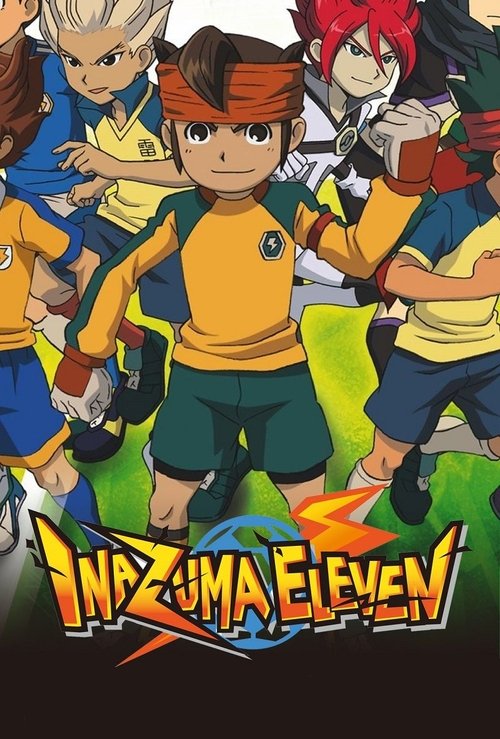
Ask Your Own Question
What is the plot?
Inazuma Eleven begins with a young and passionate soccer player named Endou Mamoru, who is the goalkeeper for the Raimon Junior High soccer team. The story opens with Endou's determination to revive the school's soccer club, which has been disbanded due to a lack of players and interest. He is inspired by his grandfather, who was a legendary goalkeeper. Endou's first challenge arises when he encounters a group of bullies who mock his love for soccer. Despite their taunts, he remains resolute in his goal to bring the team back together.
Endou's journey begins in earnest when he meets a new transfer student, Gouenji Shuuya, who is a talented forward. After a series of events, including a dramatic confrontation with the bullies during a soccer match, Endou manages to convince Gouenji to join the team. This pivotal moment marks the beginning of the revival of the Raimon soccer team, as they start to gather more members, including the skilled players Kazemaru Ichirouta, Fubuki Shirou, and others.
As the team begins to train, they face numerous challenges, including their lack of experience and teamwork. They are soon introduced to the concept of the Football Frontier, a prestigious tournament for junior high soccer teams. The Raimon team decides to enter the tournament, motivated by their desire to prove themselves and to honor Endou's grandfather's legacy. Their first match is against the formidable team, the Ootori Academy, where they struggle but ultimately manage to win through teamwork and Endou's impressive goalkeeping skills.
As the tournament progresses, the Raimon team faces increasingly powerful opponents, including the likes of the formidable team from the Zeus Academy, known for their ruthless tactics and exceptional skills. During these matches, the team learns to harness their unique abilities and develop special techniques, such as Endou's "God Hand" and Gouenji's "Fire Tornado." Each match is filled with intense action, showcasing the players' growth and determination.
Midway through the tournament, the team encounters a significant setback when they face the team from the Fubuki brothers, who are torn between their loyalty to their team and their desire to help Raimon. This internal conflict leads to a dramatic match where the brothers must choose sides, ultimately deciding to support Raimon, which strengthens the team's resolve.
As the tournament nears its climax, the Raimon team faces the final match against the powerful team from the Zeus Academy. The stakes are high, and the match is filled with tension and emotional moments. Endou and his teammates push themselves to their limits, showcasing their growth and the bonds they have formed throughout their journey. The match culminates in a thrilling showdown, where Endou's determination and the team's unity shine through, leading them to victory.
In the aftermath of the tournament, the Raimon team reflects on their journey and the friendships they have forged. They realize that their love for soccer and their teamwork have brought them closer together, and they are ready to face whatever challenges lie ahead. The series concludes with a sense of hope and determination, as Endou and his friends look forward to their future in soccer, ready to take on new adventures.
What is the ending?
Inazuma Eleven concludes with the Raimon Junior High soccer team facing off against the formidable team, the Osean National Team, in the final match of the Football Frontier. After a fierce battle on the field, the team, led by their captain Endou Mamoru, manages to overcome their opponents with teamwork and determination. The match ends with Raimon winning, securing their place as champions. The story wraps up with the team celebrating their victory, reflecting on their growth and the bonds they have formed throughout their journey.
As the final episode unfolds, the scene opens with the sun shining brightly over the stadium, filled with excited fans. The atmosphere is electric, with the Raimon team, clad in their blue and white uniforms, standing on the field, their hearts pounding with anticipation. Endou Mamoru, the passionate and determined captain, rallies his teammates, reminding them of their journey and the challenges they have faced together. His eyes shine with a mix of hope and resolve, embodying the spirit of teamwork that has brought them this far.
The whistle blows, and the match begins. The Osean National Team, known for their exceptional skills and strategies, quickly takes control of the game. Their players, including the skilled forward, Fubuki Shirou, and the tactical genius, Shinsuke, display impressive techniques that put Raimon on the defensive. Endou, however, remains undeterred, encouraging his teammates to push through the pressure. The camera captures the sweat on their brows and the determination in their eyes as they fight to regain possession.
As the first half progresses, Raimon struggles to keep up, with the Osean team scoring the first goal. The crowd gasps, but Endou's unwavering spirit ignites a fire within his teammates. They huddle together, strategizing and drawing on their unique skills. The scene shifts to a montage of training sessions, showcasing their growth and the bonds they have formed, emphasizing the importance of friendship and perseverance.
In the second half, the tide begins to turn. With renewed energy, Raimon executes a series of coordinated plays, showcasing their signature moves. The camera zooms in on Fubuki, who, despite his initial hesitation, finds the courage to unleash his powerful shot, the Ice Blade. The ball glides through the air, and the crowd holds its breath as it strikes the goalpost, bouncing back into play. The tension is palpable, and the stakes are higher than ever.
As the match nears its climax, Endou makes a pivotal decision to trust his teammates fully. He passes the ball to his childhood friend, Goenji, who channels his fiery spirit into a spectacular shot, the Fire Tornado. The ball spirals towards the goal, and the Osean goalkeeper, caught off guard, fails to block it. The stadium erupts in cheers as the score is tied.
With only minutes left on the clock, both teams are exhausted but determined. The scene shifts to Endou, who reflects on the journey they have taken together, the friendships forged, and the challenges overcome. His internal monologue reveals his deep-seated desire to protect his team and lead them to victory. The final moments of the match are a whirlwind of action, with both teams pushing their limits.
In a breathtaking finale, Endou and his teammates execute a final play, combining their strengths in a display of unity and skill. The ball soars through the air, and as the final whistle blows, it finds the back of the net. The crowd erupts in jubilation, and the Raimon team collapses in a heap of joy, tears of happiness streaming down their faces.
As the dust settles, the scene transitions to the team celebrating their hard-earned victory. Each character reflects on their personal growth: Endou, now more confident in his leadership; Goenji, embracing his role as a team player; and Fubuki, who has learned to trust his teammates. The bonds they have formed are stronger than ever, and they vow to continue playing soccer together, no matter what challenges lie ahead.
The series concludes with a montage of the team's journey, highlighting their triumphs and struggles, and a final shot of the Raimon team standing together, united and ready for whatever the future holds. The screen fades to black, leaving viewers with a sense of hope and the enduring power of friendship.
Is there a post-credit scene?
In the 2008 series of Inazuma Eleven, there is no post-credit scene following the final episode. The series concludes with a climactic match against the formidable team, Zeus, where the protagonist, Endou Mamoru, and his teammates face their greatest challenges. The final moments of the series focus on the emotional resolution of the characters and their growth throughout the journey, emphasizing themes of friendship, perseverance, and the love for soccer.
As the credits roll, viewers are left with a sense of closure regarding the characters' arcs, but there are no additional scenes or teasers that extend the story beyond the main narrative. The series wraps up with a celebration of the team's achievements and the bonds they have formed, leaving fans with a heartfelt conclusion to their adventures.
What motivates Endou Mamoru to lead the Raimon soccer team?
Endou Mamoru, the passionate and determined goalkeeper of the Raimon soccer team, is driven by his deep love for soccer and his desire to protect his friends. His grandfather, who was a legendary goalkeeper, inspires him to uphold the family legacy. Endou's unwavering belief in teamwork and his dream of becoming a great player fuel his motivation to lead the team, especially when they face formidable opponents.
How does the character of Gouenji Shuuya evolve throughout the series?
Gouenji Shuuya, initially introduced as a lone wolf with a cool demeanor, undergoes significant character development. At first, he is reluctant to join the Raimon team due to his past experiences and the pressure of expectations. However, as he bonds with his teammates and witnesses their dedication, he begins to open up. His internal struggle between his desire for independence and the importance of teamwork culminates in his decision to fully commit to the team, showcasing his growth from a solitary player to a key team member.
What role does the character of Kidou Yuuto play in the story?
Kidou Yuuto serves as a strategic mastermind and a pivotal player for the Raimon team. His analytical mind and tactical skills are crucial during matches, often devising plays that exploit the weaknesses of their opponents. Kidou's character is marked by a sense of responsibility and a desire to protect his teammates, stemming from his past experiences. His journey involves overcoming his own insecurities and learning to trust his teammates, which ultimately strengthens the team's cohesion.
What is the significance of the 'Inazuma Eleven' tournament in the series?
The 'Inazuma Eleven' tournament serves as a critical turning point in the series, representing not only a test of skill but also a journey of personal growth for the characters. It brings together various teams, each with unique abilities and backgrounds, challenging the Raimon team to push their limits. The tournament is filled with intense matches that highlight themes of friendship, perseverance, and the spirit of competition, ultimately leading to the team's evolution and their realization of the true meaning of soccer.
How does the relationship between Endou and his grandfather influence the story?
Endou's relationship with his grandfather, who was a legendary soccer player, profoundly influences his character and motivations. His grandfather's teachings instill in him a strong sense of duty and passion for soccer. Throughout the series, Endou often reflects on his grandfather's words, which guide him during challenging moments. This connection not only drives Endou to improve as a player but also serves as a source of emotional strength, especially when he faces setbacks, reinforcing the theme of legacy and inspiration in the narrative.
Is this family friendly?
Inazuma Eleven, produced in 2008, is generally considered family-friendly, aimed primarily at a younger audience. However, there are a few aspects that might be considered objectionable or upsetting for some children or sensitive viewers:
-
Rivalry and Conflict: The series features intense rivalries between soccer teams, which can lead to emotional confrontations. Characters often experience feelings of anger, frustration, and sadness during matches.
-
Physical Strain and Injuries: The show depicts soccer matches where players sometimes get injured or pushed to their limits. While not graphic, these moments can evoke concern for the characters' well-being.
-
Bullying and Teasing: Some characters face bullying or teasing from their peers, which can be distressing for viewers who have experienced similar situations.
-
Emotional Struggles: Characters deal with personal challenges, such as self-doubt, fear of failure, and the pressure to succeed, which may resonate deeply with sensitive viewers.
-
Team Disbandment: There are moments when teams face the threat of disbandment or failure, leading to emotional turmoil among the characters.
Overall, while Inazuma Eleven contains themes of competition and personal growth, it also addresses emotional challenges that may require parental guidance for younger viewers.
















